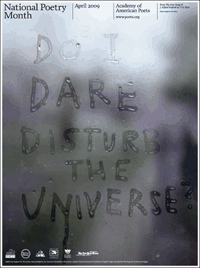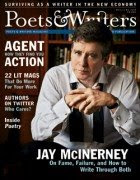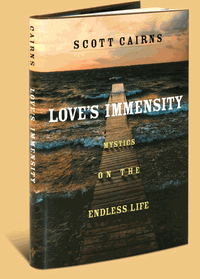>Only 9 more days of National Poetry Month left, and I’ve barely  given it a mention this year! It’s not because I haven’t been thinking about it… and reading it… and reading about it quite a bit. But two things happened yesterday to prompt this post:
given it a mention this year! It’s not because I haven’t been thinking about it… and reading it… and reading about it quite a bit. But two things happened yesterday to prompt this post:
 The May/June issue of Poets & Writers arrived in the mail, and a friend invited me to hear the Orthodox poet, writer and speaker, Scott Cairns, in Oxford on May 2 and 3. In his biography on the Orthodox Speakers Website, Cairns talks about his journey to Orthodoxy and his development as a poet: “the poems —the writing of the poems, learning to lean into the language, learning to trust poetry as my vocation— actually led me to Orthodoxy.” He has also written a memoir about visiting Mount Athos, A Short Trip to the Edge, and several others books of poetry and prose.
The May/June issue of Poets & Writers arrived in the mail, and a friend invited me to hear the Orthodox poet, writer and speaker, Scott Cairns, in Oxford on May 2 and 3. In his biography on the Orthodox Speakers Website, Cairns talks about his journey to Orthodoxy and his development as a poet: “the poems —the writing of the poems, learning to lean into the language, learning to trust poetry as my vocation— actually led me to Orthodoxy.” He has also written a memoir about visiting Mount Athos, A Short Trip to the Edge, and several others books of poetry and prose.
My first brush with Cairns’ art happened last May, when I discovered his book of paraphrased mystical writings, Love’s Immensity: Mystics on the Endless Life. I blogged about it and excerpted from it here. So, if you’re interested, Cairns is speaking at St. Peter’s Episcopal Cathedral in Oxford at 5:30 p.m. on May 2, and again on Sunday morning. A bit of info from their announcement:
mystical writings, Love’s Immensity: Mystics on the Endless Life. I blogged about it and excerpted from it here. So, if you’re interested, Cairns is speaking at St. Peter’s Episcopal Cathedral in Oxford at 5:30 p.m. on May 2, and again on Sunday morning. A bit of info from their announcement:
On Sunday, May 3rd, Mr. Cairns will be featured at the adult forum. He will read briefly from his poems and/or memoir, followed by a Q & A.
 Scott Cairns (pronounced K-air-nz, one syllable, “air” in the middle) is the director of the creative writing program at the University of Missouri. His work has been featured in The Best American Spiritual Writing (Houghton-Mifflin), and his memoir, Short Trip to the Edge, was recently published by HarperCollins. A dynamic reader and speaker, as well as one of the most prominent spiritual writers in the U.S., Cairns received a Guggenheim Fellowship in 2006.
Scott Cairns (pronounced K-air-nz, one syllable, “air” in the middle) is the director of the creative writing program at the University of Missouri. His work has been featured in The Best American Spiritual Writing (Houghton-Mifflin), and his memoir, Short Trip to the Edge, was recently published by HarperCollins. A dynamic reader and speaker, as well as one of the most prominent spiritual writers in the U.S., Cairns received a Guggenheim Fellowship in 2006.Poets & Writers always has some great stuff in it, and this issue did not disappoint. However, since I write prose rather than poetry, I always head for any craft articles about memoir and essay, and also interviews with agents and editors. I won’t spend any time commenting on my reads in this issue, but instead would like to congratulate two friends on their awards which are announced in P&W:
Dinty Moore, with whom I studied at the Creative Nonfiction Conference last year, won the 2008 Grub Street Nonfiction Book Prize for his essay collection Between Panic and Desire, which I blogged about here. Congratulations, Dinty!
 The second name I recognized in the awards section of P&W was Ravi Howard of Mobile, Alabama, whom I enjoyed meeting this past November at Southern Writers Reading, down in Fairhope, Alabama. Ravi was the Ernest J. Gaines Award for Literary Excellence for his novel, Like Trees, Walking. (This award honors an
The second name I recognized in the awards section of P&W was Ravi Howard of Mobile, Alabama, whom I enjoyed meeting this past November at Southern Writers Reading, down in Fairhope, Alabama. Ravi was the Ernest J. Gaines Award for Literary Excellence for his novel, Like Trees, Walking. (This award honors an  African American author for a book of fiction.) Ravi lived in my home town of Jackson, Mississippi for part of his childhood, and I enjoyed hearing Ravi read from this book last year. Kudos, Ravi!
African American author for a book of fiction.) Ravi lived in my home town of Jackson, Mississippi for part of his childhood, and I enjoyed hearing Ravi read from this book last year. Kudos, Ravi! I was thinking about his words when I picked up last Sunday’s (April 5) copy of the New York Times Book Review and read the essay on the back inside cover, “Got Poetry?” by Jim Holt, author of Stop Me If You’ve Heard This. Holt started memorizing poetry a few years ago, and now has about 100 poems in his mental cache, including some as long as 2,000 lines! He takes them in short pieces, reciting them while jogging or just walking around Manhattan. Holt shares tips on the process of memorizing, but it’s the why that struck me:
I was thinking about his words when I picked up last Sunday’s (April 5) copy of the New York Times Book Review and read the essay on the back inside cover, “Got Poetry?” by Jim Holt, author of Stop Me If You’ve Heard This. Holt started memorizing poetry a few years ago, and now has about 100 poems in his mental cache, including some as long as 2,000 lines! He takes them in short pieces, reciting them while jogging or just walking around Manhattan. Holt shares tips on the process of memorizing, but it’s the why that struck me:Kind of like the monks “munching” on God’s word during the day.
Holt quotes Clive James’s book, Cultural Amnesia, where he declares that “the future of the humanities as a common possession depends on the restoration of a simple, single ideal: getting poetry by heart.”
It’s a physical feeling, and it’s a deeply pleasurable one. You can get something like it by reading the poem out loud off the page, but the sensation is far more powerful when the words come from within.
 few of my favorite poems and try memorizing them on my morning walks. Ahhh, I can almost smell the ocean breeze now. But I’m leaving Memphis with a mixture of joy and sadness, as my dear friend, Nancy, lost her husband Lloyd to cancer today. I was blessed to spend some time with them on Friday, and I hope that my presence was even a tiny balm on Nancy’s pain. (This is Nancy and Lloyd about a year ago.) And that hope is expressed beautifully in one of my favorite poems, (which was also set to music by Kim Delmhorst, “Invisible Choir,” on her Strange Conversation CD), so I’ll leave you with George Eliot’s 1867 poem: (the last verse is my favorite)
few of my favorite poems and try memorizing them on my morning walks. Ahhh, I can almost smell the ocean breeze now. But I’m leaving Memphis with a mixture of joy and sadness, as my dear friend, Nancy, lost her husband Lloyd to cancer today. I was blessed to spend some time with them on Friday, and I hope that my presence was even a tiny balm on Nancy’s pain. (This is Nancy and Lloyd about a year ago.) And that hope is expressed beautifully in one of my favorite poems, (which was also set to music by Kim Delmhorst, “Invisible Choir,” on her Strange Conversation CD), so I’ll leave you with George Eliot’s 1867 poem: (the last verse is my favorite)